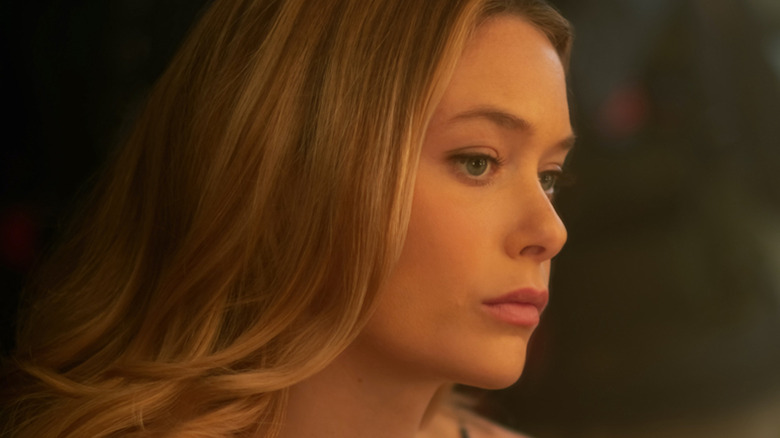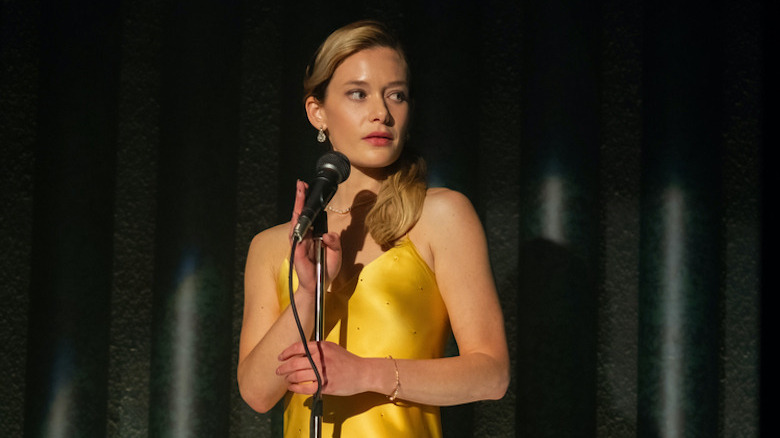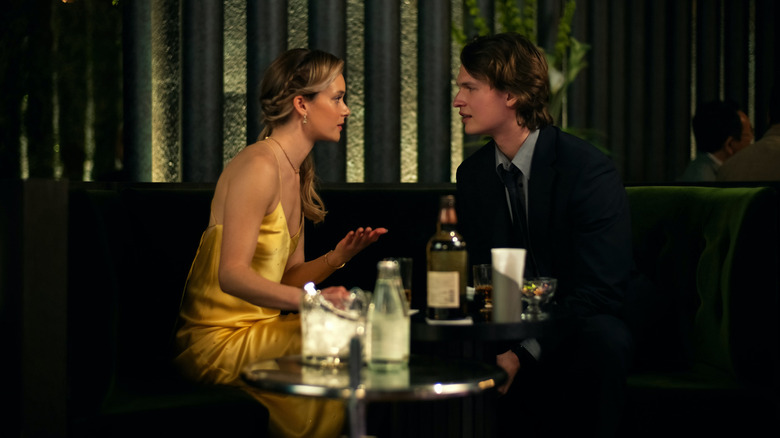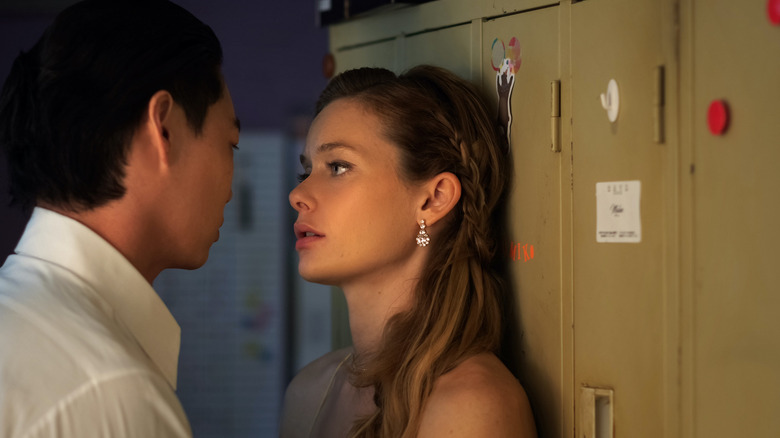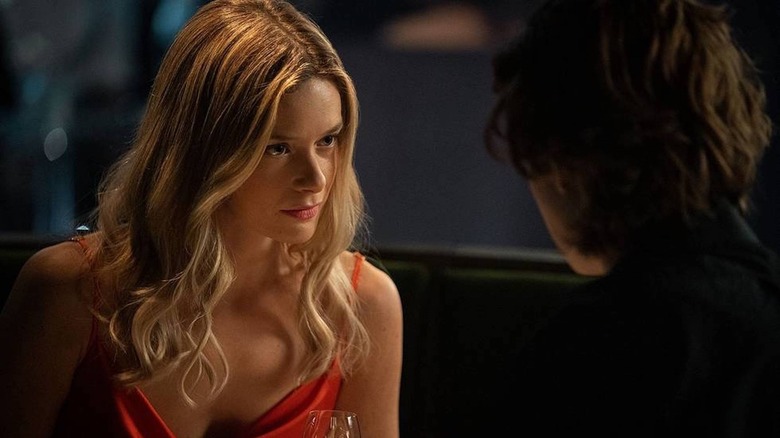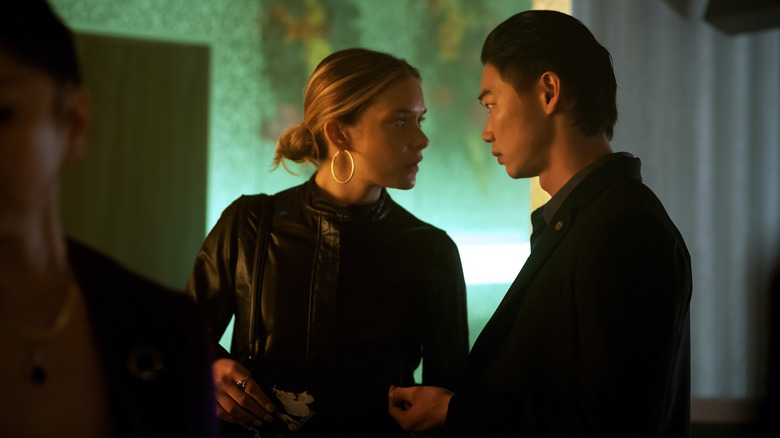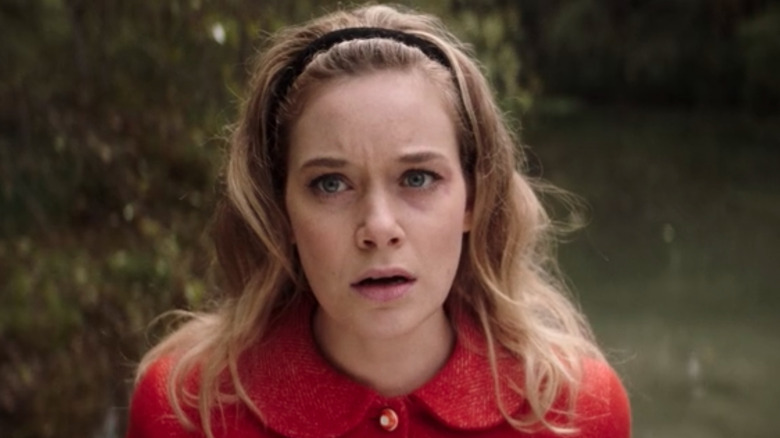Tokyo Vice's Rachel Keller Talks Japanese Nightlife, Michael Mann, And A Potential Season 2 - Exclusive Interview
This interview contains spoilers for Season 1 of "Tokyo Vice."
HBO Max's gritty crime drama "Tokyo Vice" explores the dangerous world of the Japanese Yakuza in the late 1990s through the eyes of rookie reporter Jake Adelstein (Ansel Elgort), the only American working at a large Tokyo newspaper. Loosely based on the memoir of the same name by Adelstein, the show spotlights Jake's dogged pursuit of a big story through the lens of the intricate rules and expectations of Japanese culture.
One of the places he looks for a lead is the Japanese hostess club Onyx, where Rachel Keller's Samantha works. The only American in the show besides Jake, Samantha has found her calling serving customers in this underground bar where she mingles with people from all walks of life, including members of the Yakuza. But like Jake, she's also ambitious and determined to fulfill her dream of opening her own club no matter the cost.
Keller makes Samantha a magnetic enigma. Fiercely independent and in control, Samantha has made a life for herself in Japan, and when she learns that life could be threatened she's willing to take drastic and surprising action to protect it. Keller has already proven her wide range as an actor, starring in such varied projects as "Fargo," "Legion," and "Dirty John." With "Tokyo Vice," she further establishes her versatility while playing a woman who can be wide-eyed and innocent one moment and savvy and sophisticated the next — and she does it all while speaking Japanese.
In an exclusive conversation with Looper, Keller talked about learning Japanese, the fascinating world of hostess clubs, working with executive producer and pilot director Michael Mann, and whether "Tokyo Vice" could get a second season.
The challenge of learning Japanese
We first see your character in "Tokyo Vice" singing in Japanese. How did you feel about being introduced in that way?
The introduction that Michael Mann shot, when I saw the first episode, I felt like there's no cooler introduction for a character. You pan across, there's this out-of-focus red dress. It was gorgeous.
Singing is hard. Singing in front of people is hard. The Japanese language is hard. I practiced a lot and over and over, especially because that song ["Sweet Child O' Mine"] is originally a Guns N' Roses song. The other karaoke song I sing later in the season is originally a Japanese song, so in a way, that one was a little bit easier to learn because the original lyrics for it are written in Japanese and the vowel sounds, it's all in the same cadence. It was a really fun challenge. It's a great way for her to be introduced.
It looked so natural when you speak Japanese on the show, did you know the language previously or did you learn for the show?
It was a challenge. The Japanese language is so difficult, partly because the sentence structure has no relation to English grammatically. It's almost opposite. My Japanese teacher actually sent me this graph that showed how the sentence is actually completely opposite. When you're learning Spanish or Italian, there's things you can relate, grammatically, to English that is not [part of Japanese.] I shed some tears learning Japanese.
My mom grew up in Japan — a random thing. My grandfather worked for Northwest Airlines, which isn't an airline anymore. When I was little, I always learned how to count to 10. I always knew that, but I didn't really know any other Japanese. I only studied it for a couple of months before we started shooting.
Delving into the unique world of Japanese hostess club
You play an American who works as a hostess at a Japanese club. That is something I was completely unfamiliar with. What research did you do to prepare for the role?
[This] was what I was most excited about in the script. ["Tokyo Vice" creator and showrunner] J.T. [Rogers], being such a talented playwright, wrote this really fresh, tight crime noir that was super different than American crime stories in that it is the Japanese culture, which is fraught with honor and shame. There's this real depth and richness to that behavior that's really different than any other mafia crime story. I was particularly interested in the Japanese hostess culture.
I didn't know anything about it. "What the hell is this? Why are these women coming to this country to work at a bar? What is the nightlife? Why does it work like that?" There was a lot that I was curious about. There's some great books. "Nightwork" is a great book by Anne Allison. There's also a great book, "90-Day Geisha," that was super fascinating.
We interviewed hostesses and went to hostess clubs. Most of the women that I interviewed really loved their jobs because the feeling I got was that they are working to become financially independent. Women from all over the world come to Japan to be a hostess, particularly because it's a job where any sexual act is off the table. It's about the art of conversation, the art of intimacy.
There's some really horrific stories, like the famous Lucie Blackman story, that we do explore in the show, which is important. There was and continues to be endless exciting research to do about Japanese nightlife and hostess culture.
Developing a mysterious character
We don't really learn about your character's backstory until several episodes into the show, which makes her very mysterious up until then. What did you know about her going into filming and how did that help you develop her?
I think that we had most of the episodes beforehand. I learned pretty soon, if not right away, where she came from, which was great. It's always great to have as many of the scripts. It's part of the delirious joy of television, where you're like, "Where is this story going because the new episode is coming out and I don't know?" It's hard to not [be sure]. In a film, you have the entire script, and you're diving into this arc of a character. [With] television, you're in the hands of the creative people and waiting to hear how the story unfolds.
We got really lucky. J.T. is a man who values transparency and honesty, and he genuinely wanted us to have a good time [and] not suffer through anything. There was an incredible amount of collaboration. I had so many questions and lots of opinions about specific scenes, what [Samantha] says, how she expresses herself, and I was certainly heard, which was great.
Working with Michael Mann
Michael Mann, who directed movies like "Heat" and "The Insider," directed the pilot and he's an executive producer on the show. He has such a specific style that fits "Tokyo Vice" so well. What was it like working with him?
I agree. He would have multiple cameras going at the same time. It was like theater in the sense that you walk onto the set, like you walk onto [the] Onyx [hostess club] set and you don't know when they're recording it ... when he zooms in on someone, there's this eyewitness journalism eye on the behavior that's going on in the club, which fit really well for this strange [setting]. There's no equivalent in the Western world of a hostess club.
There was a lot of thrill and almost compassion in the way that he shot it because he was trying to catch it all. We were all very committed to doing it right and playing it as best we could. It was an incredible treat to work with him. He really respects actors, so I felt incredibly safe and [in] super creative hands.
Samantha's path to liberation and Season 2 hopes
The show explores sexism and the exploitation of women. Your character deals with that quite a bit. What did you feel was compelling about that part of the story?
It's pretty clear that there are only two Americans in the show. The American-ness they've captured is a sort of blind ambition, which she certainly has coming from being in and under the eye of a very extreme religious family and church.
She finds the hostess club and the hostess job as a way to liberate herself, which many women do feel that come from Bulgaria and Thailand and America and London, that they're in a position in their life that they can't be independent. They go and become a hostess to make their own money so they can live their own lives. She sort of takes that and runs with it.
Do you know if there are plans for a second season?
Yes, I think so. At the end, she is forced into going into the business with the Yakuza, which is a really tricky place to be. Once they've done you a favor, you're really caught in another kind of web.
Playing superheroes and choosing roles
You've played a superhero before in "Legion." Would you ever be interested in reprising that role? Is there another superhero you'd like to play?
Syd [her character from "Legion"] is wonderful. [I would] love to play her again. Yes. I would be happy to.
When you're working with great people and you have a great script and something about it is super fun and interesting, it doesn't really matter what it is. If it's a really small, independent film, or a crime noir drama on HBO, or a really small sleek superhero TV show with effects that's set in the '60s, Britannica-mod futuristic thing, it doesn't really matter what it is. If it's fun and if there's a lot of questions and interesting things about it, then of course.
This article has been edited for clarity.
The first season of Tokyo Vice is now available to stream on HBO Max.
